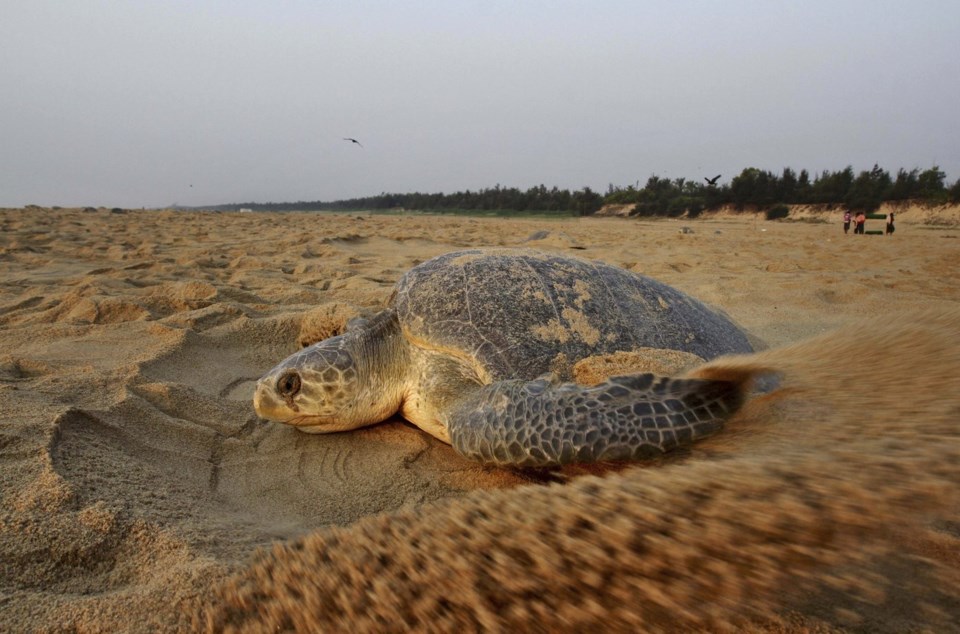BENGALURU, India (AP) — Over 400 endangered sea turtles have washed ashore on India's east coast near the city of Chennai in the last two weeks in an event not witnessed in over two decades.
Olive ridley turtles travel thousands of miles for ideal nesting conditions on India’s coast. But the species has been threatened for years as the number of nesting beaches around the world shrinks, and mass deaths like these can be caused by fishing nets that can catch and harm the species.
In a typical year, the city's coastline can expect between 100 to 200 adult turtle deaths, said Shravan Krishnan, a volunteer with Chennai-based Students Sea Turtles Conservation Network. “This year, we've already crossed 200 dead turtles in a little more than two weeks,” he said.
Krishnan is also concerned about the low number of turtles nesting on shore. He and other conservationists walk along the city's beaches at night to collect and transfer turtle nests so the eggs are not vandalized by beach-goers or eaten by dogs. “We have found only four nests so far, which is also really worrying,” he said.
Highest turtle deaths in the last two decades
Environmentalists and forest department officials have been seeing at least ten dead turtles every day for the past few days, sometimes much more.
It's the highest number officials have seen since 2014, more than 900 olive ridley turtles were found dead along the southern Indian coast. Experts say the deaths are most likely due to large fishing nets that trawl the ocean floor.
Manish Meena, the city's wildlife warden, said groups have been actively trying to create awareness among fishers to release turtles that might get caught in nets and have also asked the coastguard to monitor fishing activity.
A local government order was also implemented in 2016 to stop trawl boats from casting giant nets that sweep up everything on the ocean floor from getting within five nautical miles of the coastline during turtle nesting season. The law also mandates devices known as turtle excluder devices, that can help turtles escape nets.
Shantanu Kalambi, a marine veterinary specialist with the conservation organization ReefWatch, said that when the trawlers catch turtles, they are unable to surface for air at regular intervals. And the devices that help turtles escape aren't used, because they reduce fishers' catch, environmentalists said.
A number of threats
Olive ridley turtles are considered a vulnerable species as they lose their habitats, are subject to marine pollution and can get trapped in fishing nets.
As their eggs need two months to hatch — like most sea turtle species — they're also threatened by increased land activity on beaches and coastlines, warmer temperatures and light pollution that can disorient infant turtles.
Over 500,000 turtles nest every year in beaches further up India’s east coast in Odisha state — a mass nesting phenomenon that turtle conservationists call Arribada. But only one in about 1,000 turtle hatchlings survive to adulthood.
But the turtles are important in maintaining the healthy balance of the marine ecosystem. One of their main food sources is jellyfish, and an abundance of jellyfish could have adverse consequences for the marine ecosystems.
“As a species, they are millions of years old and they play an essential role in the food chain,” said Kalambi.
___
Follow Sibi Arasu on X at @sibi123 ___
The Associated Press’ climate and environmental coverage receives financial support from multiple private foundations. AP is solely responsible for all content. Find AP’s standards for working with philanthropies, a list of supporters and funded coverage areas at AP.org.
Sibi Arasu, The Associated Press



